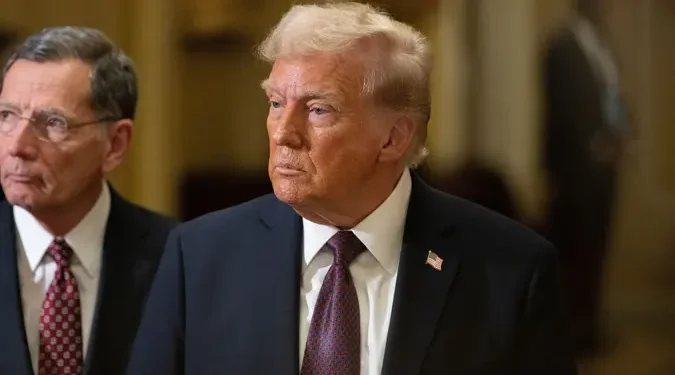Nathan Posner / Shutterstock.com
Commitment to Our Readers
GOBankingRates’ editorial team is committed to bringing you unbiased reviews and information. We use data-driven methodologies to evaluate financial products and services – our reviews and ratings are not influenced by advertisers. You can read more about our editorial guidelines and our products and services review methodology.

20 Years
Helping You Live Richer


Trusted by
Millions of Readers
Trump’s inauguration day is coming up quickly. Making the necessary preparations before the president-elect steps into the White House can put you in a better financial spot.
The Trump Economy presents opportunities and risks for investors. The upper-middle class can benefit from making the following money moves.
Diversify Assets Outside of the US Financial Systems
Blake Harris is an attorney and the founding principal of Blake Harris Law. He is an expert in asset protection and offshore banking solutions. He believes that upper-middle class investors may benefit from moving some of their assets outside of the U.S. financial systems.
“Between the recent flip-flop to reinstate the Corporate Transparency Act reporting requirements, the looming debt ceiling crisis and instability within certain American banks, the economic outlook suggests potential volatility. High-net-worth individuals should hedge against these uncertainties by diversifying their holdings internationally,” Harris stated.
“Establishing accounts or investments in stable foreign banking systems, such as Switzerland or Singapore, not only safeguards funds from domestic financial turbulence, but also offers privacy and jurisdictional stability,” Harris continued. “Smart money moves outside the U.S. in times of uncertainty, ensuring that assets remain secure and accessible regardless of domestic policy shifts or economic downturns.”
Focus on Estate Planning
Raul Gastesi is an attorney and co-founder of Gastesi, Lopez & Mestre. He has assisted clients with estate planning for more than 35 years, and suggested now may be a good time for upper-middle class individuals to plan out their estates.
“One smart money move for high-net-worth individuals to consider, particularly focusing on estate planning, is to take proactive steps before the Trump-era tax cuts potentially sunset in 2025,” he said. “This could include utilizing the current high federal estate tax exemption of $13.75 million ($27.5 million for married couples) to transfer wealth to heirs, either through lifetime gifts or trusts, to lock in these favorable rates.”
Gastesi suggested three specific estate planning strategies to consider:
- Grantor Retained Annuity Trusts (GRATs): Allows tax-efficient wealth transfers while taking advantage of the current exemption.
- Dynasty Trusts: These can protect assets for multiple generations within the current framework.
- Irrevocable Life Insurance Trusts (ILITs): A strategy to leverage life insurance for estate tax planning while locking in current rates.
Safeguard Wealth Through Offshore Trusts
Harris recommended setting up an offshore trust leading up to Trump’s inauguration. He mentioned Trump’s acknowledgment of lawsuit culture as a reason to act quickly.
“Trump’s acknowledgment of the lawsuit culture in the U.S., while valid, is unlikely to see immediate reform due to competing priorities in his administration,” Harris noted. “The ‘loser pays’ system would be a monumental legal change, requiring extensive legislative battles. In the meantime, high-net-worth individuals can proactively shield their assets by establishing offshore trusts in jurisdictions known for strong asset protection laws, such as the Cook Islands or Nevis.”
Harris offered additional context about the perks of setting up an offshore trust.
“Offshore trusts provide legal and financial insulation from lawsuits, ensuring that personal wealth remains protected regardless of the litigation environment in the U.S,” he concluded. “This move is especially critical in an era where frivolous lawsuits and jackpot jury awards pose ongoing threats to substantial wealth.”




